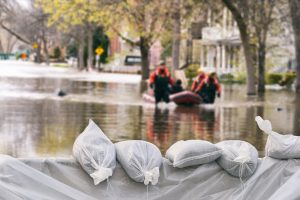
The National Oceanic and Atmospheric Administration has awarded funding for climate science and community resilience projects involving researchers from The University of Alabama, Sea Grant programs and universities around the Southeast.
NOAA’s Climate Program Office recently announced more than $171 million to support projects aimed at improving U.S. climate challenges. The agency’s newly launched Adaptation Sciences Program will use more than $4.8 million to fund 20 new 2-year projects centered on future flooding impacts in coastal areas.
One of those projects will focus on Weeks Bay, Alabama, and southeastern Texas where investigators will use elaborate flood and vulnerability models to help local governments address resilience and communication efforts in response to perceived flood risks. Dr. Hamed Moftakhari, UA assistant professor of civil, construction and environmental engineering, is one of the lead investigators on that team.
“The primary goal of our project is to understand how coastal communities perceive current and future compound flood hazards,” said Moftakhari. “This understanding helps better characterize the way local governance networks emerge and are shaped by climate and flood factors.”
Dr. Wanyun Shao, assistant professor in UA’s Department of Geography, is part of another team that is working with the Sewerage and Water Board of New Orleans, Louisiana, to better understand the geographical and temporal variability in rainfall and flooding. The project will help the city to create a master plan to prioritize water infrastructure investments over the next five decades by coupling climate data with demographic and behavioral data.
NOAA’s CPO also awarded $400,000 for four new 1-year projects through its Regional Integrated Sciences and Assessments Program. One of those projects will allow Sea Grant programs and universities in the Southeast U.S. and Caribbean regions to study climate inequities in coastal communities.
“The Southeast and Caribbean Climate Alliance will work with communities in these regions to identify the root causes of health disparities and inequities and understand ways in which these are worsened by climate change,” said Mark Risse, director of UGA Marine Extension and Georgia Sea Grant.
Coastal communities are experiencing increased flooding that can cut off access to healthcare facilities. Rising seas lead to saltwater intrusion, impacting water supply and wastewater infrastructure. Floodwaters that cover roads or encroach on residential homes carry pollutants and bacteria. All these threats pose a risk to public health.
“Populations that are typically most vulnerable to these risks are low-income communities, communities of color, rural communities, tribal and indigenous communities,” said project lead Mona Behl, associate director of Georgia Sea Grant at UGA Marine Extension and Georgia Sea Grant.
The alliance includes experts at Marine Extension and Georgia Sea Grant, Florida Sea Grant, Mississippi-Alabama Sea Grant, Puerto Rico Sea Grant, the University of Virgin Islands and the Centers for Disease Control and Prevention.
“Regional collaboration on the impact of climate on populations is key to understanding best practices and how to leverage them at the local level in terms of community health,” said Scott Rayder, executive director of the Alabama Water Institute. “By teaming together, we will be able to identify problems and solutions faster in service of these at-risk populations and provide better health outcomes for these communities.”
Over the next year, the team will work to identify the most vulnerable communities in the Southeast and Caribbean regions and cultivate partnerships with local leaders, businesses and public health professionals to improve communication, share existing tools, and identify information and resource needs. They will also host workshops to gather input that will inform policies, programs, and trainings needed to design community-led solutions to reduce health disparities and inequities in these regions.
“Local solutions to climate change are most effective when they are developed holistically, taking into consideration racial, socioeconomic and structural barriers,” Behl said. “By working with communities in these regions, we will develop a shared vision and research framework to improve community health, promote economic development and build climate resilience.”
Information from an article at University of Georgia Marine Extension and Georgia Sea Grant was used with permission in this report.
